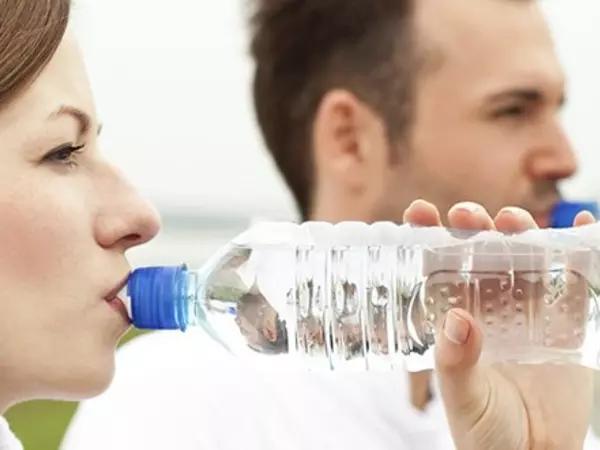Dehydration is a common condition in which the body loses more fluids than it takes in. The main symptoms of dehydration are thirst, fatigue, and dizziness, but the less well-known symptoms of reduced cognitive ability are overlooked. Let’s look into the causes and symptoms of this condition and the best ways to hydrate fast.
📝 Understanding dehydration
Water is essential for the proper functioning of the human body. It plays a crucial role in various processes, including digestion, nutrient absorption, and waste elimination. Water makes up approximately 60% of our body weight and is present in every cell, tissue, and organ. Maintaining a healthy body water balance is crucial for overall well-being.
Dehydration is a state in which the body’s water content falls below the normal level, resulting in an imbalance of fluids and electrolytes. This can occur due to a variety of factors, including excessive sweating, diarrhoea, vomiting, or simply not drinking enough water. When the body loses too much water, it struggles to maintain its normal functions, leading to a wide range of symptoms.
Dehydration can range from mild to severe. Mild dehydration may cause thirst, headaches, and fatigue, while moderate dehydration can lead to dizziness, dry mouth, and decreased urine production. Severe dehydration on the other hand can be life-threatening, causing symptoms such as rapid heartbeat, confusion, and even organ failure.
🏥 Dehydration symptoms
Some common symptoms in adults include:
- Increased thirst
- Lightheadedness
- Dark yellow urine
- Confusion
- Dizziness
- Bad breath
Some common symptoms in young children:
- Dry mouth and tongue
- Crying but no tears
- No wet diapers for three hours
- Sunken eyes, cheeks
- Sunken soft spot on top of the skull
- Irritability
It’s important to note that the severity and specific symptoms may vary depending on the individual’s level of dehydration.
🦠 Possible causes of dehydration
Several factors can contribute to the development of dehydration.
Excessive fluid loss
Conditions or activities that lead to excessive fluid loss, such as diarrhoea, vomiting, excessive sweating, or intense exercise, can increase the risk of dehydration and associated stomach pain.
Inadequate fluid intake
Simply not drinking enough fluids, particularly water or other hydrating fluids can result in dehydration and its accompanying digestive discomfort.
Certain medications
Some medications, such as diuretics, laxatives, and antidepressants, can increase the risk of dehydration and contribute to stomach pain.
Underlying health conditions
Certain medical conditions, such as diabetes, kidney disorders, or gastrointestinal diseases, can predispose individuals to dehydration.
Environmental factors
Hot or dry climates, high altitudes, and other environmental factors that increase fluid loss can also lead to dehydration.
🧪 Diagnosis
Medical history and physical examination
Your healthcare provider will likely ask about your symptoms, fluid intake, and any recent changes in your health or lifestyle that may have contributed to the issue. They will also perform a physical examination, checking for signs of dehydration, such as dry mouth, decreased skin elasticity, and low blood pressure.
Laboratory tests
Depending on the severity of the symptoms, your healthcare provider may order laboratory tests to assess your electrolyte levels, kidney function, and overall hydration status. These tests may include blood and urine tests.
Ruling out other conditions
Your healthcare provider may also need to rule out other potential causes of your dehydration. This may involve additional tests or referrals to specialists.
💧 Ways to hydrate quickly
Drink water
When thinking of how to rehydrate, always go for plain water as your first choice. It’s cheap and contains no added sugars or calories. Water is vital for virtually every bodily function, including body temperature regulation, transporting nutrients, removing harmful waste and digestion.
There isn’t a correct answer to the amount of water you should be drinking. It will vary for everyone depending on age, location, activity level and health. For a guideline, The Institute of Medicine of the National Academies suggest that well-hydrated people typically drink about:
- 3.7 L (125 oz) of water daily if they are male
- 2.7 L (91 oz) of water daily if they are female
Drink an oral rehydration solution
Oral rehydration solutions are specialised rehydration drinks used to prevent and treat dehydration. These are usually used when someone suffers from conditions such as diarrhoea or severe vomiting, which causes a significant amount of fluid loss. These formulations replace lost fluids and electrolytes to help the body recover and restore hydration levels. Electrolytes like sodium, calcium, magnesium and potassium have several benefits like maintaining fluid balance, and they help hydrate faster than water alone.
Rehydration drinks are similar to sports drinks but without the backing of science. They tend to include sugar, salt, and other electrolytes. Oral rehydration solutions have more electrolytes and less sugar.
Dietary changes
Adjusting your dietary habits can also help restore fluid levels. Consume hydrating foods such as cucumbers, watermelon, tomatoes, spinach, mushrooms, blueberries, strawberries, lettuce, celery, coconut water and courgettes. They have a high water content and are a good source of hydration. They also contain other essential vitamins and minerals to support health and wellness.
Try herbal teas
Herbal teas, such as chamomile, peppermint, and rooibos are both hydrating and offer calming and digestive support. Drinking herbal teas can be soothing due to the hot water and the additional antioxidants provided by the herbs and botanical plants.
Drinks to avoid
Alcohol and coffee are two drinks that can cause dehydration and are best to avoid. These fluids tend to pull water from your body and promote dehydration. Fruit juice and fruit drinks may have too many carbohydrates and too little sodium, and they may upset your stomach.
📊 What are the levels of dehydration?
Healthcare providers divide dehydration into three levels:
- Mild: In mild cases taking in more fluids by mouth is enough. Drink water, but if you experience significant sweating or fluid loss from vomiting and diarrhoea, an electrolyte drink can be taken. Symptoms include being slightly thirsty
- Moderate: Moderate dehydration requires an IV (hydration through your vein). You’ll get this in an urgent care, emergency room or hospital. Symptoms include dry mouth, darker urine, and mild fatigue
- Severe: Severe cases can be life-threatening and even require hospitalisation. Symptoms include dizziness, confusion, and rapid heartbeat
💉 Prevention
Proactive measures can help reduce the risk of developing dehydration-related stomach pain. Here are some tips:
- Stay hydrated by drinking water regularly throughout the day. Keep a water bottle nearby
- Increase water intake during periods of increased fluid loss, such as exercise, hot weather, or illness
- Limit consumption of diuretic beverages, such as alcohol and caffeinated drinks
- Maintain a balanced diet with foods high in water content to support hydration and digestion
- Manage any underlying medical conditions that may contribute to dehydration
- Seek medical attention if you experience persistent or severe abdominal pain, especially if accompanied by signs of dehydration
📝 Conclusion
The easiest way to hydrate is to drink plenty of fluids. The best choice for rehydrating fast depends on what’s causing the dehydration. Water is a great option, in general. If you’re dehydrated because you’ve been sweating a lot from intense exercise, for example, a sports drink might be your best choice. Dehydration from vomiting or diarrhoea requires an oral rehydration solution. Eating hydrating foods like vegetables and fruit helps since they contain a lot of fluid. Always contact a healthcare professional for medical advice if symptoms worsen.
Sources
- Dehydration related abdominal pain (DRAP) – PubMed
- Dehydration: Symptoms & Causes – Cleveland Clinic
- Report Sets Dietary Intake Levels for Water, Salt, and Potassium To Maintain Health and Reduce Chronic Disease Risk – National Academies
- Electrolytes – StatPearls – NCBI Bookshelf
Medical Disclaimer
NowPatient has taken all reasonable steps to ensure that all material is factually accurate, complete, and current. However, the knowledge and experience of a qualified healthcare professional should always be sought after instead of using the information on this page. Before taking any drug, you should always speak to your doctor or another qualified healthcare provider.
The information provided here about medications is subject to change and is not meant to include all uses, precautions, warnings, directions, drug interactions, allergic reactions, or negative effects. The absence of warnings or other information for a particular medication does not imply that the medication or medication combination is appropriate for all patients or for all possible purposes.








